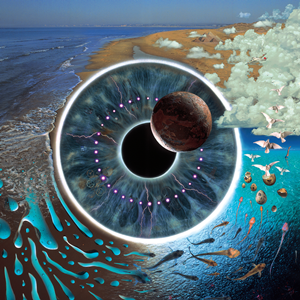 Seven years is a long time between albums for anybody, but since the Roger-less Pink Floyd had toured for about two of those years, their follow-up wasn’t that long in coming. But what made The Division Bell a better album was that it was pretty good; designed as a band collaboration with all three members on board—albeit with Gilmour’s wife given several co-writing credits—it has enough of the classic Floyd vibe throughout to make it a worthy successor to their old albums.
Seven years is a long time between albums for anybody, but since the Roger-less Pink Floyd had toured for about two of those years, their follow-up wasn’t that long in coming. But what made The Division Bell a better album was that it was pretty good; designed as a band collaboration with all three members on board—albeit with Gilmour’s wife given several co-writing credits—it has enough of the classic Floyd vibe throughout to make it a worthy successor to their old albums. It starts, as it should, with a lengthy instrumental to set the mood. “What Do You Want From Me”, driven by an electric piano, doesn’t have to stretch too far to resemble “Have A Cigar” to remind the kids who this band is. The first real surprise is “Poles Apart”, with its spiraling acoustic guitars and smooth steel, marred only by a midsection that visits a carnival midway for some reason. “Marooned” is another instrumental that’s just plain bleak, followed by the recent history lesson of “A Great Day For Freedom” and the redemption of a lush chorus. And Rick Wright gets his first solo vocal in decades on the depressing “Wearing The Inside Out”.
The second half of the album is a little more cheery. “Take It Back” is built around trademark delayed guitar riffs, delivered in a style more akin to U2. There’s something about the way the tempo cuts in half for the last lines of the chorus, setting up for the dreamy intro to “Coming Back To Life”. The cowbell on that track gets maddening after a while, but the solos are classic Gilmour. “Keep Talking” is the most blatant expression to be the theme of the album, a plea for communication, and notable for the computerized appearance of Stephen Hawking. “Lost For Words” brings back the jaunty acoustic, and despite another bridge that travels to a boxing ring, brings the album down to earth with the blunt description of what his “enemies” told him when he asked “to wipe the slate clean”. The finale returns us to Grantchester Meadows amid the tolling of Parliament bells for “High Hopes”, which, despite its morose grandiosity, still yearns for a simpler time.
Naturally, Waters dismissed the album as the sloppy work of imposters, pretenders to his throne, and in some ways, he’s correct. But while it doesn’t reach the same level as the band’s ‘70s peak, The Division Bell—as does, to a much lesser extent, A Momentary Lapse Of Reason—succeeds by capturing some of the Pink Floyd magic that was sadly missing from nearly everything Waters had done since going on his own. Thus, the band gave the people what they want. (Waters, in comparison, tended to tell the people what they want, and pouted when no one agreed with him.)
 By spearheading the revival of Pink Floyd, David Gilmour made the smart move. As the guitarist, composer and singer, he was able to sell his solo work via the Pink Floyd label; work that wouldn’t (and didn’t) sell much outside of the core Floyd audience. That’s a shame, as his actual solo albums were just as melodic and commercial as either of the two last Floyd albums, but without the pretension.
By spearheading the revival of Pink Floyd, David Gilmour made the smart move. As the guitarist, composer and singer, he was able to sell his solo work via the Pink Floyd label; work that wouldn’t (and didn’t) sell much outside of the core Floyd audience. That’s a shame, as his actual solo albums were just as melodic and commercial as either of the two last Floyd albums, but without the pretension.
But following the release of the obligatory double live album Pulse, which repeated half of Delicate Sound Of Thunder but sported a complete performance of The Dark Side Of The Moon as well as a great take on “Astronomy Domine”, Gilmour must have felt that his mission was accomplished. Outside of continual repackages, it seemed like there was never to be another new Pink Floyd album.
Pink Floyd The Division Bell (1994)—3½
Pink Floyd Pulse (1995)—2½
No comments:
Post a Comment